Volkswagen Group Logistics’ plan for cutting supply chain emissions will require multiple transport modes, technology innovation and investment with logistics partners for the long term.
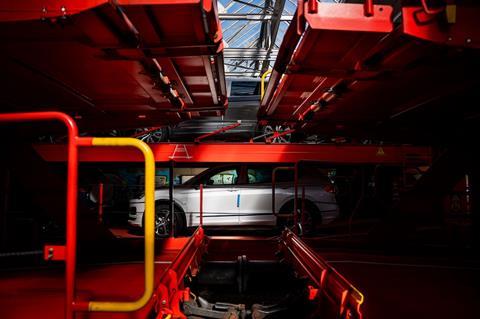
Simon Motter has continuously emphasised sustainability during his tenure as head of Volkswagen Group Logistics, notably its ‘goTOzero’ strategy, which aims to reduce emissions and reach carbon neutrality in its logistics in line with the company’s net zero targets.
Part of this approach is in network optimisation and reducing waste, such as consolidating existing logistics and packaging assets through transport network engineering. “Good capacity utilisation always leads to better efficiency and lower emissions, however logically we also know that this won’t be enough to reach our targets,” says Motter.
Over the medium to longer term, influencing decisions on sourcing and localisation will also be important to meeting sustainability goals. But not all components can be sourced locally, and Volkswagen Group will have to ensure its freight transport is as sustainable as possible.
One very important measure for the company is to increase rail transport both for inbound and vehicle logistics, says Motter, especially where it uses green electricity, as Volkswagen Group does across rail services in Germany. Despite recent and ongoing bottlenecks, strikes and performance issues, he confirms that using more rail remains a priority.
But there are limits to how much it can be increased. Already, poor performance on rail in Germany has led Group Logistics to divert material and vehicles to trucks, often in direct opposition to its green objectives. “It was not our choice – but we have sometimes been denied the opportunity to use the railway simply because there has been no capacity or there have been works and closures on the line,” he says.
With many track works still to come over the next decade especially in Germany, Motter does not see a quick solution. That is why he stresses the importance of intermodal transport and interoperability across logistics modes wherever possible. “We will need to think even more in terms of intramodality, with long distances moving by rail, and short distances by road, and flexibility across the network,” he says. “We believe that this is the future and the way we want to develop.”
Group Logistics is designing logistics networks in line with this vision, for example in how the group is planning battery logistics supply chains, with strong rail links across supplier, battery cell and assembly plants. It is also exploring options with partners to leverage intermodal transport wherever possible.
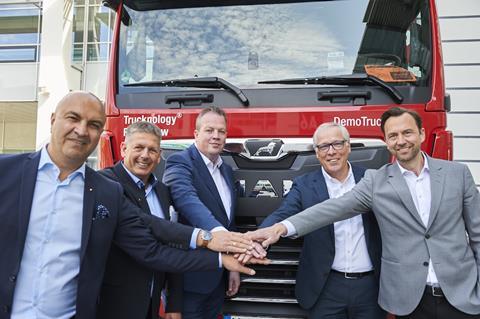
Reducing emission across road, sea and air transport
But it will be vital to make truck transport more sustainable, too. That will include the use of electric trucks, with Group Logistics making important first steps this year. Following an agreement in 2023, one of its logistics providers, Duvenbeck, will be the first among several logistics partners to implement the ‘e-trucks’ to serve Group Logistics across its material logistics routes. The logistics company signed a letter of intent last year to buy 120 e-trucks from Volkswagen Group truckmaker MAN through 2026, with a proportion planned to serve Group Logistics. Along with learning more about the length of routes, loading and conditions in which such trucks will perform best, Group Logistics will study the need for charging infrastructure at plants.
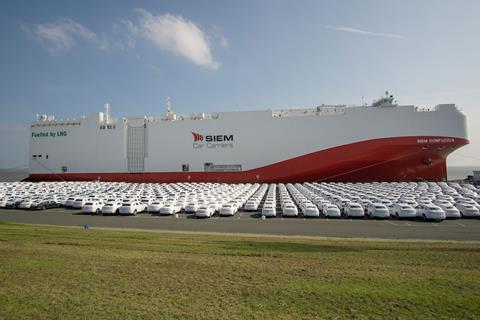
But Motter is realistic that it will take many years to convert truck fleets to e-trucks, and decades yet before shipping and air freight can be electrified. That is why he stresses ‘defossilisation’ in logistics, including the use of alternative and synthetic fuels. This approach is evident in the group’s own chartered shipping fleet, where this year it is implementing four dual-fuel, LNG-powered ro-ro ships for Atlantic shipping routes, equipment that produces around 20% fewer CO2 emissions compared to existing assets, according to the company. Group Logistics is also working with partners using ships in Europe powered by vegetable oil biofuels, which Motter says can be carbon neutral for short-sea shipping.
Because ships have lifespans of 30 years or more, Motter stresses flexibility in drivetrains, and equipment capable of using different fuels or of being upgraded. He points to positive opportunities for the use of methane-based drivetrains and ammonia.
The in-house resources of the Volkswagen Group are also advantages both in commercial vehicle and marine technology. “We are working together and learning a lot with MAN and Scania, including the infrastructure that we need to provide,” says Motter. “We are also in contact with other logistics providers as well on where else we can implement these opportunities.”
MAN Energy Solutions, another subsidiary, develops a range of powertrains for marine, industrial, oil and gas sectors, including for large shipping vessels.
Encouraging investment and partnership fit for the future of logistics
But meeting carbon neutrality goals will take a long-term perspective and partnership well beyond the entities of the group, Motter acknowledges. He remains open and engaged with offers from logistics partners to use alternative, more sustainable fuels across the network, including for container shipping and air freight. But such offers remain limited.
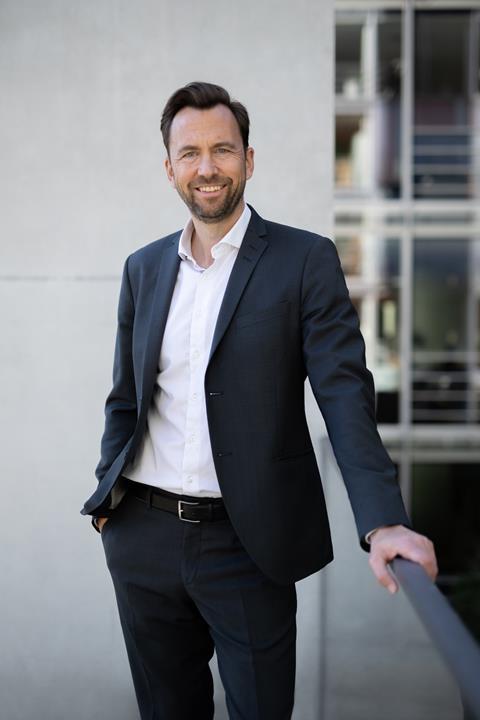
Motter also acknowledges that making the choice to spend more on sustainable transport and fuel options is not always easy, especially when there may not be a clear timetable for return on investment – and particularly at a time when cost reduction is a key goal. But Motter says that it is important for the group to look ahead to changing costs, regulations and risks. Volkswagen Group Logistics is working on a carbon price calculation that also factors into logistics decisions in sourcing, for example – an add-on cost based on the price of emissions.
“But of course it is a theoretical price, and it is not always feasible to apply it from a hard economic point of view,” he says.
However, in the coming years, increases in toll roads linked to CO2 in Europe, as well as tighter shipping regulations, will lead to further convergence in cost for greener transport. Other products that may not be economical at a mass level today – such as certain e-trucks or fuels – will be more competitive in five years’ time, and Volkswagen should be ready to implement them. “That is why we have to work on these solutions now so that we can be prepared to achieve a sustainable and economic solution in the future,” he says.
Logistics providers also need to look beyond what works best for them today towards the most favourable solution in five years, Motter adds. He recognises that there is uncertainty in making these assessments, but Group Logistics wants to send a signal to the market that it is willing to work together, for example in the pilot with Duvenbeck and MAN.
“We always look forward to logistics providers approaching us with such projects, which we will actively scrutinise and try to shape them,” he says. “There are always going to be several partners who want to be involved in such topics, and I can say that I among those who really want it. And that is because I am certain that in doing so, we are securing the future.”
Oliver Bronder, head of vehicle logistics at Volkswagen Group Logistics, will be a keynote speaker at Automotive Logistics and Supply Chain Europe, March 19-21 in Bonn, Germany. The conference will feature major OEMs, suppliers and industry experts discussing how to leverage logistics as a competitive advantage. Find out more and register to join.Find out more and register for ALSC Europe
Volkswagen Group Logistics series: Simon Motter on securing the supply chain
- 1
- 2
- 3
- 4
 Currently reading
Currently readingThe many roads, fuels and tech leading to zero emission logistics at Volkswagen Group
- 5


























![Global[1]](https://d3n5uof8vony13.cloudfront.net/Pictures/web/a/d/s/global1_726550.svgz)









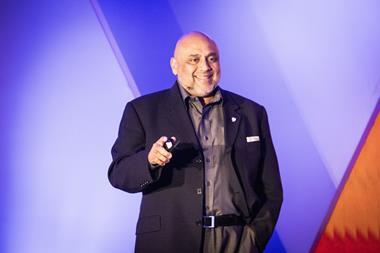

![Bild 1_Duvenbeck[99]](https://d3n5uof8vony13.cloudfront.net/Pictures/380x253/1/5/2/317152_bild1_duvenbeck99_485066.jpg)
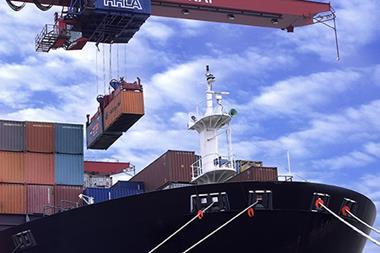
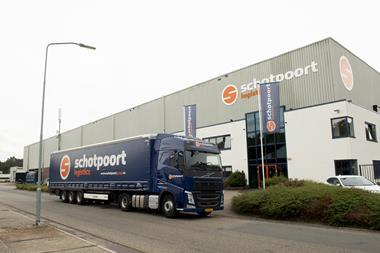




No comments yet